"I know I went wrong somewhere," Bill kept repeating after this game. "Somewhere early on, I musta done something wrong." It's true, he made a few clumsy moves in the opening and midgame. But it's the last mistake that really counts, isn't it?
Route 20 Chess Club
Freeport, Illinois, April 13, 2010
1.d4 d5 2.c4 dxc4 3.Nf3 Nc6 4.e3 Nf6 5.Bxc4 Ne4
Not a mistake, but not conventional, either. Convention calls for developing the queenside bishop, either to f5 or to g4.
6.0-0 Bg4 7.d5 Na5?
White is in excellent shape -- and the knight is toast -- if he replies by retreating with 8.Be2, followed by 8...c6 9.b4 Qxd5 10.Qc2. I took a more positional approach.
8.Bb5+ c6 9.dxc6 bxc6 10.Ba4 Qxd1 11.Rxd1
If there's any moment to which Bill might point and say, "That's where I went wrong," it might be the next three moves:
11...g6?? (11...Nc5 12.Bc2 Nab7 13.Nbd2) 12.Rd4 Bf5?? (12...Bxf3 13.gxf3 Nc5 14.Nxa4 Rxa4) 13.Nbd2 Bg7?? (13...Nc5 14.e4 Bd7) 14.Rb4
Of course, it's good to be forgiving, as I am with my 14th move -- much better is 14.Rd5! (safe, because the c6-pawn is pinned) Nxd2 15.Nxd2.
14...Nxd2 15.Bxd2
Maintaining my development lead, which 15.Nxd2 0-0 would hand over.
15...0-0 16.Rc1 Bd7??
This doesn't look so awful; the problem is, it falls far short of what Bill really needs to do, which is 16...Rfd8. Bill is now at a decisive disadvantage and will stay there for a good, long while.
17.Rc5 Rab8 18.Rxa5 Rxb4 19.Bxb4 Rb8 20.Rxa7
Needlessly giving up a bishop for a pawn; 20.a3 would have avoided that. However, this drags Bill's bishop out of its fianchetto position and paralyzes it on the back rank, which will come in handy later.
20...Rxb4 21.Ra8+ Bf8 22.b3 h5
Kind of an eyebrow-raiser. I'm not sure what Bill is aiming at. 22...f6 would have thwarted my next move.
23.Ne5 Be6
How would you take the c6-pawn?
24.Bxc6
Gary Sargent, who was watching our game, opined afterward that this was an error and that I should have taken with the knight. I had in fact thought quite a bit during the game about this move and marked it on my scoresheet for later assessment. My rationale for taking with the bishop was to free a piece that had been hemmed in and place it on the long diagonal, where it might flourish. Sure, I could get a tempo on the b4-rook, but it's not like it was trapped or anything; I might well end up kicking it to a more favorable square, whereas it wasn't doing jack on b4.
According to Fritz, I made the right call: it assesses the difference between 24.Bxc6 and 24.Nxc6 at nearly three-fourths of a pawn in favor of the bishop capture. In fact, it considers no fewer than four other moves (the pawn moves f3, f4 and h3, along with Kf1) preferable to Nxc6, the best line from which is 24...Rb7 25.h3 Rc7.
24...Kg7 25.f4 f6 26.Nd3
Gary's other postgame comment was that I could have distracted the king with 26.Nxg6 Kxg6, allowing me to nab Bill's bishop with 27.Rxf8, for a net gain of a pawn. On this one, Fritz bears out Gary's judgment.
26...Rb6 27.Ba4 Bd5 28.Rd8 Be4??
A nonthreat, which I duly ignore.
29.h3 Rd6 30.Rxd6 exd6 31.Bb5 d5 32.a4
Break time!
32...Bd6 33.a5 Bxd3 34.Bxd3 Bc5 35.Kf2 Kf7 36.Kf3 f5 37.g4 hxg4+ 38.hxg4 fxg4+ 39.Kxg4 Bxe3 40.Kg5 Ke7 41.Bxg6 Kd7 42.Kf5 Kc7?!
42...Kc6 43.Bf7 Ba7 is more assertive.
43.Ke5 d4 44.Ke4
Nyet!
44...Bd2 45.f5 Bxa5 46.Kxd4
I'm letting my edge erode a little bit, but I figure I still have room. Now the endgame begins in earnest.
46...Kd6 47.f6 Ke6 48.f7 Bb4 49.Kc4 Bf8 50.b4 Kf6 51.Bh5 Kg5 52.Bf3
Not really necessary in light of 52.b5 Kxh5 53.b6 Kg6.
52...Kf6 53.Bd5 Ke7 54.Kc3
I can almost hear Fritz's exasperation. "Just push the b-pawn, already!"
54...Kd6 55.Kd4 Bg7+ 56.Kc4 Kc7 57.b5 Kb6 58.Bc6 Bf8 59.Kd5 Kc7 60.Ke6 Kb6 61.Kd7 Bb4 62.Ke8 Kc7 63.f8Q Bxf8 64.Kxf8 Kb6 65.Be8 Kc7 66.Ke7 Kb6 67.Kd6 Ka7 68.Kc7 Ka8
Bill is mine now.
69.b6?? ½-½
Stalemate! Garrrr!
As I said, it's the last mistake that really counts.
(The winning move is 69.Bc6+ Ka7 70.b6+ Ka6 71.b7 Ka5 72.b8Q Ka6 73.Qb6#.)

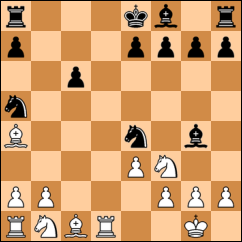
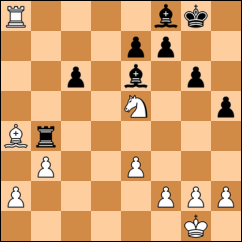
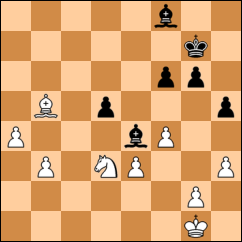
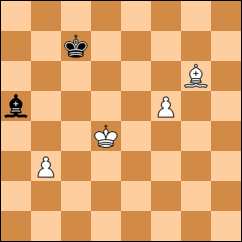
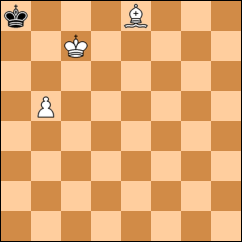



0 comments:
Post a Comment